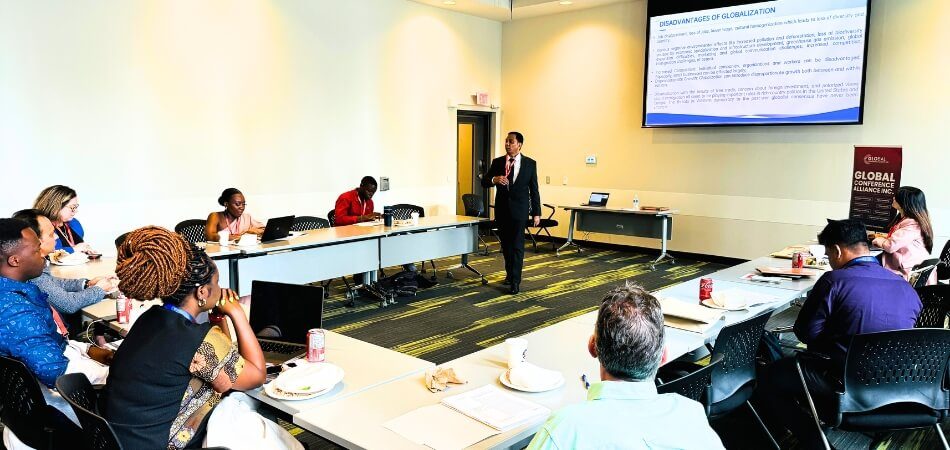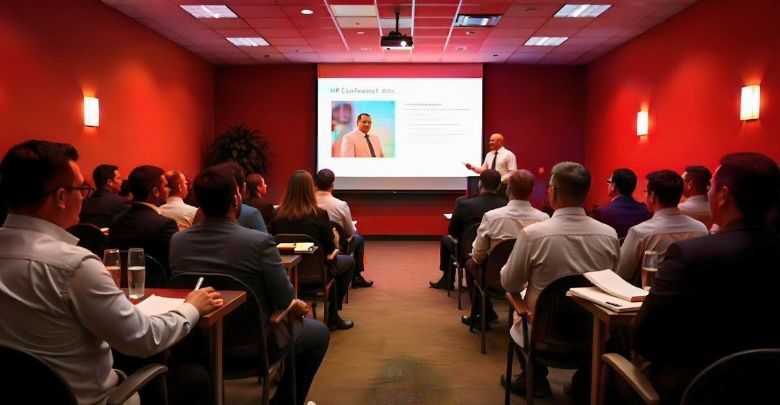A great opportunity awaits at the autism and disability studies conference in Canada, where pioneering research, innovative practices, and global perspectives on autism and disability will be presented. With its lineup of renowned speakers and carefully planned schedule, this event offers a valuable opportunity for learning and networking.
For international attendees, particularly from Cameroon, careful planning is essential to ensure a smooth journey. Now the question is: How to attend the autism and disability studies conference in Canada from Cameroon?
To make this journey, start by researching the conference’s key themes, speakers, and schedule to ensure it aligns with your professional interests. After that, register online and request an invitation letter, which will be essential for your visa application. Once your visa is approved, finalize travel arrangements to Canada.
Are you ready to learn more about this amazing experience? Let us guide you through every essential step so that your attendance is trouble-free.
Who Benefits Most from Attending an Autism and Disability Studies Conference in Canada?
Many individuals can benefit from attending the autism and disability studies conference in Canada. It brings together experts, advocates, and members of the community who are dedicated to autism and disability issues. Attendees can maximize their experience and knowledge by knowing who benefits most. The following is a detailed explanation of this query:
Researchers and Academics
Researchers play a crucial role in advancing knowledge about autism and disability. Attending conferences allows them to share findings and discover new insights. Networking with peers can lead to collaborative projects and research opportunities. Engaging with diverse perspectives helps researchers refine their work and methodologies.
Educators and Practitioners
Educators benefit significantly from the conference’s wealth of resources. Workshops provide practical strategies to support students with autism and disabilities. Connecting with other educators fosters a supportive community for sharing best practices. Learning about the latest research can boost teaching methods and improve student outcomes.
Advocates and Activists
Advocates and activists find valuable tools at these conferences. They gain knowledge about policy changes and best practices to support their causes. Engaging with other advocates can inspire new initiatives and collaborations. This exchange of ideas is essential for driving meaningful change in communities.
Families and Caregivers
Families of individuals with autism and disabilities gain crucial insights at the conference. They can access resources that empower them in their caregiving roles. Connecting with professionals offers guidance on navigating services and support. Emotional support from others facing similar challenges can also be incredibly valuable.
Policy Makers and Stakeholders
Policy makers can benefit from the innovative ideas shared at the conference. Knowledge of the latest research informs better decision-making for services and funding. Engaging with stakeholders provides insights into community needs and gaps. Ultimately, this collaboration leads to more effective policies that support individuals with autism and disabilities.
So, attending the canadian autism and disability studies conference can be impactful for anyone involved in the autism and disability fields. Each group gains amazing insights and practical tools to promote inclusivity, advocacy, and support for individuals with autism and disabilities.
What Draws International Attendees to Attend an Autism and Disability Studies Conference?
The autism and disability studies conferences provide valuable insight and connections that go beyond geographical boundaries. These gatherings serve as hubs for knowledge, advocacy, and support, attracting participants worldwide. Here’s a closer look at what draws international attendees to these events:
- Global Networking Opportunities: Connecting with professionals from diverse backgrounds expands international attendees’ perspectives. These connections often foster future collaborations and partnerships worldwide.
- Access to Leading Research: The conference showcases the latest research in autism and disability studies. Attendees gain access to groundbreaking findings from experts in the field.
- Exposure to Inclusive Practices: Sessions explore best practices for creating inclusive environments. These insights help attendees implement progressive strategies in their respective countries.
- Insights from Renowned Speakers: Speakers include leaders in autism and disability research and practice. Their expertise offers attendees invaluable knowledge and inspiration for change.
- Workshops on Practical Skills: Hands-on workshops provide skills for real-world applications in autism and disability support. Attendees leave equipped with actionable strategies and tools.
- Supportive Community Atmosphere: A welcoming community encourages meaningful discussions and exchanges. Attendees feel a shared commitment to improving autism and disability support.
- Focus on Policy and Advocacy: Sessions highlight effective policy approaches and advocacy strategies. International attendees gain insights on creating impactful change within their regions.
- Opportunities for Cultural Exchange: Learning from diverse cultures enriches the knowledge of global autism and disability challenges. During the event, attendees share their cultural perspectives and learn from each other.
How to Attend the Autism and Disability Studies Conference in Canada from Cameroon?
A conference like the autism and disability studies conference in Canada can be both exciting and rewarding. For participants from Cameroon, careful planning is essential to ensure a smooth experience. Here’s a step-by-step procedure to help you manage the process effortlessly:
Step 1: Research Conference Details
Begin by thoroughly exploring the conference’s themes, key speakers, and event schedule. This knowledge helps you determine sessions that align with your interests. Knowing the conference’s focus will improve your engagement. Planning ahead will also make registration more streamlined.
Step 2: Register Online for The Conference
Complete the online registration to secure your spot at the event. Many conferences allow international attendees to request invitation letters during registration. These letters support visa applications, so ensure this step is not skipped. Early registration is often advantageous in terms of fees and access.
Step 3: Request an Invitation Letter
While registering, make sure to request an official invitation letter. This document is essential for visa processing and shows intent to attend. Include all necessary details, like your passport information, to avoid delays. This letter is a crucial part of traveling for the conference.
Step 4: Secure Your Visa
After obtaining the invitation, apply for a Canadian visa with adequate preparation. Gather all required documents, including the invitation and proof of conference registration. Remember that the visa process may take some time. Apply early to avoid any last-minute issues.
Step 5: Book Travel and Accommodation
Once your visa is confirmed, start booking flights and accommodation near the venue. Early bookings can help reduce travel costs significantly. Make sure your accommodation is accessible and convenient for the conference duration. Also, consider local transportation options for added convenience.
Step 6: Prepare for the Conference
Review the conference agenda and plan which sessions you’d like to attend. Basically, participating in autism and disability conference events with a clear plan will enrich your experience. Familiarize yourself with the venue layout to navigate efficiently. Packing essentials like business cards and note-taking tools can also be helpful.
Tips for Booking Flights and Accommodations
Booking flights and accommodations for an international conference or event can be straightforward with the right approach. Planning saves money, reduces stress, and ensures a smoother experience. Here are some essential tips to make your travel arrangements more efficient.
- Book Early for Better Deals: Reserving flights and accommodations early often means better rates and more options. Popular destinations fill up quickly, so act promptly.
- Use Price Comparison Tools: Price comparison websites help you find the best deals across various airlines and hotels. Checking multiple sites maximizes your savings potential.
- Consider Flexible Travel Dates: Being flexible with travel dates can reduce costs, especially around peak seasons. Compare different dates to find the most affordable options.
- Look for Nearby Airports: Flying into alternative airports near your destination can lower ticket prices. It also gives you more airline and schedule choices.
- Read Accommodation Reviews Carefully: Reading reviews from previous guests provides insight into the property’s quality and service. Reliable reviews help you avoid unpleasant surprises.
- Book Directly for Added Perks: Booking directly through airlines and hotels may offer exclusive perks, like free upgrades or points. Loyalty programs often provide valuable extras.
- Check Cancellation Policies: Flexible cancellation policies are essential in case of unexpected changes. Always review policies to understand potential fees or refund options.
- Consider Package Deals: Travel packages often bundle flights, hotels, and car rentals at a discount. These bundles can simplify booking while providing cost savings.
How to Make the Most of The Autism and Disability Studies Conference in Canada?
The opportunity to expand your knowledge and network is one of the greatest benefits of attending an international conference. By joining autism and disability conferences in Canada you can learn, exchange, and expand professional growth in the disability field. Here’s how to maximize your experience when joining autism and disability conferences in Canada:
Plan Your Schedule in Advance
Check the conference program early to identify must-see presentations and workshops. Prioritize sessions that align closely with your interests or professional needs. Consider time for breaks; you don’t want to overwhelm yourself. This strategic planning helps ensure you don’t miss key talks.
Engage Actively in Sessions
Don’t just listen—participate. Ask questions to clarify points or deepen the discussion during Q&A segments. Engaging with speakers can enhance your knowledge of complex topics. These interactions often provide new perspectives and insights.
Network with Peers
Conferences are perfect for building professional relationships. Introduce yourself to fellow attendees during coffee breaks and social events. Exchange contact information to stay connected after the event. Networking can open doors to collaborative opportunities and friendships.
Explore Exhibitions and Posters
Take time to visit exhibition stands and poster presentations. Exhibitors often showcase innovative products and services that can be crucial for your work or research. Poster sessions allow you to discuss research findings directly with the authors. These are great opportunities to learn about cutting-edge advancements.
Take Detailed Notes
Write down key points and ideas from each session. Notes can be invaluable for revisiting insights once the conference is over. They also serve as a resource for sharing knowledge with colleagues back home. Keeping a detailed record helps reinforce learning.
Follow Up After the Conference
Review your notes and contact new connections within a few days of returning home. Sending a follow-up email can reinforce the relationships you’ve built. Share what you learned with your peers to extend the conference’s value. Continuing the conversation can lead to ongoing collaborations.
Frequently Asked Questions (FAQs)
A visit to an international conference can raise many questions, especially for attendees traveling from Cameroon to Canada. Below are some frequently asked questions that cover essential topics related to attending the autism and disability studies conference, helping you prepare for a successful experience:
What Documents Do I Need for Canadian Conference Entry?
You’ll need a valid passport, a Canadian visa, and an invitation letter from the conference organizers. Ensure these documents are up-to-date and easily accessible, as they’re essential for both entry and travel throughout Canada.
What Should I Pack for A Canadian Conference in Autumn or Winter?
Canadian autumns and winters can be cold, so bring warm clothing, including jackets, gloves, and scarves. Additionally, pack essentials like conference materials, chargers, and any travel-sized toiletries you may need during your stay.
How Can I Handle Jet Lag upon Arrival in Canada?
To minimize jet lag, try adjusting your sleep schedule a few days before departure. Staying hydrated, avoiding caffeine on the flight, and resting on the first day in Canada can also help ease the effects of jet lag.
What Payment Methods Are Accepted in Canada?
Most Canadian establishments accept credit cards, debit cards, and Canadian dollars. Inform your bank of travel plans to avoid blocked transactions, and consider carrying a small amount of cash for convenience in smaller shops.
Are There Sightseeing Opportunities Around the Conference Location?
Canada offers diverse sightseeing, from historical landmarks to nature parks, depending on the conference city. Research nearby attractions and plan outings during breaks to experience Canada’s culture and natural beauty without missing conference activities.
Bottom Line
A thorough preparation and strategic planning are essential for participating in the autism and disability studies conference in Canada from Cameroon. Get familiar with the conference details so that you can align your sessions with your professional interests. For the purpose of obtaining a visa, the process of registering online and requesting an invitation letter must be completed as quickly as possible. Additionally, making arrangements for travel and accommodations in advance can result in significant savings and convenience.
Be active during the conference, network with peers, and follow up on new contacts afterward. Whether you’re a researcher, educator, or advocate, following these steps outlined in “How to attend the autism and disability studies conference in Canada from Cameroon?” will ensure a successful and enriching experience. This preparation not only contributes to personal and professional development but also maximizes the conference’s overall value.








